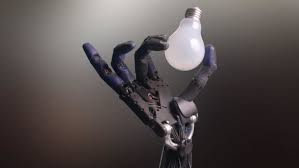Source: gizmodo.com
A collaborative research team claims their artificially intelligent system should be recognized as the rightful inventor of two innovative designs, in a potentially disruptive development in patent law.
Patent law is complicated even at the best of times, but a new project led by researchers from the University of Surrey could make it more convoluted still. Called the Artificial Inventor Project, the initiative is “seeking intellectual property rights for the autonomous output of artificial intelligence.”
As BBC reports, the researchers are claiming that an artificially intelligent system named DABUS is the rightful inventor of two designs, namely a complex, fractal-like system of interlocking food containers and a rhythmic warning light for attracting extra attention. To that end, the researchers are filing patents on behalf of DABUS with the respective patent bodies in the United States, the United Kingdom, and the European Union.
The inventor of DABUS, Stephen Thaler, is also involved in the project. DABUS is famous for creating surrealist art, but it can do a lot more. And in fact, it’s not designed for a specific task. Instead, Thaler describes DABUS as a “Creativity Engine” capable of generating “novel ideas,” which it compares to other ideas in its pre-existing database to assess just how novel its newfangled idea actually is.
Thaler, along with Ryan Abott, a professor of law and health sciences at the University of Surrey, and several other collaborators, say the food containers and the warning lights were invented by DABUS.
“If similar training had been given to a human student, the student rather than the trainer would meet the inventorship criteria as inventor,” wrote the researchers at their website. In the case of DABUS, the “machine rather than a person identified the novelty and salience of the instant invention.” Inventors shouldn’t be restricted to “natural persons,” according to the researchers, and any machine that meets inventorship criteria “if it were a natural person should also qualify as an inventor,” they argue.
Without AI inventorship provisions, the Artificial Inventor Project is worried that intellectual property rights will never be assigned to the machines that make inventions.
Machines should be recognized as the inventors of their creations, but they shouldn’t own patents, argue the researchers. Instead, the owners of the machine should get rights to the patent. Machines should not have patents, the researchers argue, because they “do not have legal personality or independent rights, and cannot own property,” the team wrote.
Speaking to the BBC, Abbot said it’s common today to have “AIs writing books and taking pictures,” but without a traditional author, copyright protection isn’t possible in the United States.
“So with patents, a patent office might say, ‘If you don’t have someone who traditionally meets human-inventorship criteria, there is nothing you can get a patent on,’” Abbot told the BBC. “In which case, if AI is going to be how we’re inventing things in the future, the whole intellectual property system will fail to work.”
A spokesperson from the European Patent Office told the BBC that AI is simply a “tool used by a human inventor,” and that changes to this logic would have “implications far beyond patent law, i.e., to authors’ rights under copyright laws, civil liability and data protection.”
This is a super fascinating topic, and I’m curious to see where it goes from here. If the Artificial Inventor Project is unsuccessful, and if their fears are valid, things could get increasingly weird and messy in the patent world.
